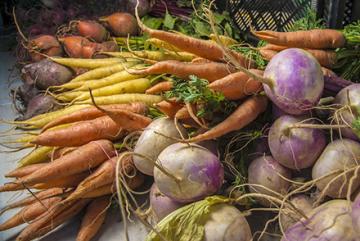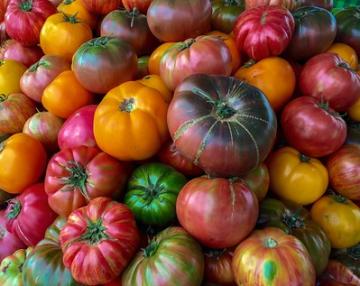The Secret to Happiness May be Growing in Your Garden

Venders' vegetables at the U.S. Department of Agriculture farmers market at the USDA headquarters in Washington, D.C. Research findings demonstrate that increasing consumption of vegetables can positively influence wellbeing. (USDA photo by Preston Keres)
For centuries, humans have sought the recipe for happiness: Money? Love? Fame? The answer, it turns out, may be none of the above, but rather: vegetables. New research by a team of ARS scientists at the Grand Forks Human Nutrition Research Center in Grand Forks, ND, reveals that increasing the quantity of vegetables in a person’s diet, even briefly, can improve their overall sense of wellbeing. In a recent study, the scientists provided 75 people with the U.S. Dietary Guidelines for Americans recommended number of servings of vegetables over 8 weeks, while a control group of study participants ate a diet with very little vegetable content. Study participants who ate the vegetables reported a statistically significant increase in their happiness; their counterparts did not. The effect also persisted for some time after the study ended, when the group eating vegetables had returned to a diet without many vegetables.
Most Americans routinely eat less than the recommended quantity of vegetables, even though research shows that eating vegetables provides many health benefits. Part of the reason has to do with the brain’s reward circuits; some foods, including many that contain high levels of salt, fat, and other unhealthy ingredients, tend to be reinforcing — that is, the more of them that people eat, the more they want to eat. An earlier, related study that the ARS researchers conducted found that vegetables are not reinforcing, making it more challenging to motivate people to eat them. In response to that finding, the researchers decided to investigate whether there were ways they could make vegetables more reinforcing, to help people obtain the health benefits they offer. The researchers theorized that if they knew that vegetables made them feel better, people might be motivated to eat more of them.

Consuming vegetables, like these organic heirloom tomatoes at the Jack London Square Farmers' Market in Oakland, CA, can contribute to improved feelings of happiness. USDA photo by Lance Cheung.
“We knew that vegetables were not going to make neurotransmitters fire in the brain like chocolate,” said Shanon Casperson, a research biologist at the Center, “but we thought, ‘Well, let’s see what we can do to help people think about vegetables differently.’”
Using a popular 4-question survey called the Subjective Happiness Scale (SHS), Casperson and her colleagues asked study participants to rate their agreement with statements like, “In general, I consider myself a very happy person,” and “Compared to most of my peers, I consider myself very happy.” The participants were given the survey repeatedly over the course of the study to capture any changes in their responses. While previous studies had shown a correlation between vegetable consumption and wellbeing, this study helped establish that the vegetables actually caused the improvement, because rather than just observing existing eating patterns, it changed them and measured the effects.
The results were intriguing enough that the researchers plan to perform a similar study with other foods, examining whether pulses also improve feelings of happiness. For now, though, they believe that their study gives people one more reason to eat their vegetables.
“The take-home message for a study like this is so simple,” said Casperson. “If you increase your vegetables, it can have a positive impact on your mental wellbeing. That’s such a powerful message, and it’s something that is within people’s control.”
Read ARS’s press release about the study. — Kathryn Markham, ARS Office of Communications
You May Also Like:

